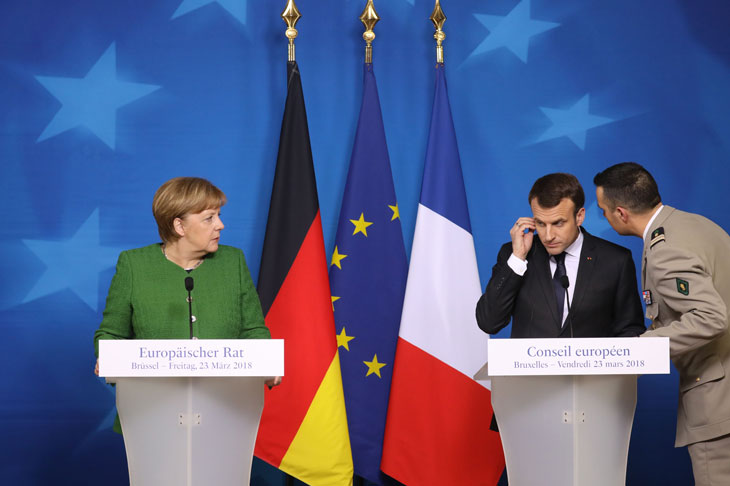Pigs might fly – but they will not be Australian porkers (or beef or lamb) flying into the European Union even if the Turnbull government succeeds in getting a free trade agreement out of Brussels. There is no way the government will achieve last month’s stated objective of aiming ‘for full tariff liberalisation of agriculture’. Trade Minister Ciobo admitted that for some items it would be ‘difficult’ and Malcolm Turnbull noted that as a result of the EU’s protectionist policies, Australia now imports more agricultural products from Europe than we export there. In the good old days, Europe (including the UK) was Australia’s biggest agricultural customer, with Britain alone taking 40 per cent of our total exports of which more than 80 per cent were agricultural – especially beef and lamb. Britain joining the Common Market stopped all that.
And take with many grains of salt the ministerial claims about the potential for Australian exporters in the EU market of 520 million people even though it is already our second-biggest trading partner (due to a massive negative trade balance) and our largest source of foreign investment last year. There’s no mention of the significantly deflating fact that our major customer in that market, taking 40 per cent, is in the (muddled) process of trying to remove itself and we plan to do a free trade deal with Britain if and when the EU divorce papers are signed. Admittedly, there clearly are some benefits that should emerge from an FTA with the EU; beyond agriculture, where the Common Agricultural Policy’s prohibitive quotas back terrible tariffs. There is potential to deal with the EU’s higher duties than ours on many industrial goods, like 12 per cent on minerals and metals and 11 per cent on wood and paper. And Ciobo argues that ‘a strong EU is in Australia’s best interests in protecting and promoting a rules-based international order’.
But after three weeks in former eastern bloc countries, some of which have become bottomless pits into which rich EU neighbours keep pouring billions of their own taxpayers’ euros, (while others are in serious dispute with Brussels over immigration), there are reasonable grounds for concern about the EU’s post-Brexit future. Can it afford Romania and Bulgaria, the EU’s poorest (and now financially threatened) member nations? It’s not just the prospective end of Britain’s six billion euros annual contributions to Brussels’ money-box; the EU bureaucrats want to link its funding to ‘deficiencies in the rule of law’ – aimed squarely at corruption and attacks on judicial independence in former eastern bloc members. When Romania and Bulgaria joined the EU, it was conditional on Brussels monitoring the requirement that there had to be progress ‘in the fields of judicial reform, corruption and organised crime’. The latest EU report notes that ‘political instability has affected the capacity to reform’, with growing tension in Romania between parliament, the government and the judiciary exacerbated by the president sacking the anti-graft prosecutor.
Both Romania and Bulgaria have vigorously attacked this serious threat as have better-off neighbours Poland and Hungary, which are also in dispute with Brussels. After 10 years of EU membership and subsidy, Romania’s GDP per head is, despite some improvement, still only 60 per cent of the EU average and Bulgaria’s is even worse at 47 per cent. But there are now more Bulgarians working outside their country than in it, probably accounting in part for the reduction of poverty in Bulgaria from 60 per cent to 40 per cent and, similarly, in Romania from 47 per cent to 37 per cent.
Maybe tourism will help out. That seems the only rational justification for their recent application to join the euro, and so lose control of monetary policy. Rusting corpses of cranes and the skeletons of failed factories line the Romanian-Bulgarian lower Danube – the detritus of industrial death. The Danube, with its bundles of barges pushed by a single tug is still a major form of industrial transport. But with tourism’s increasing significance, last month I saw more luxury River Cruise boats than tugs on the Danube’s wide waters. If Romania and Bulgaria do fall by the wayside, who’s next?
Got something to add? Join the discussion and comment below.
Get 10 issues for just $10
Subscribe to The Spectator Australia today for the next 10 magazine issues, plus full online access, for just $10.
You might disagree with half of it, but you’ll enjoy reading all of it. Try your first month for free, then just $2 a week for the remainder of your first year.














Comments
Don't miss out
Join the conversation with other Spectator Australia readers. Subscribe to leave a comment.
SUBSCRIBEAlready a subscriber? Log in